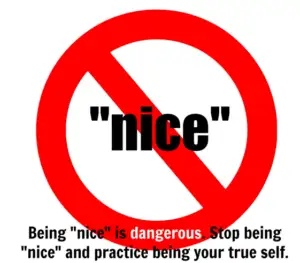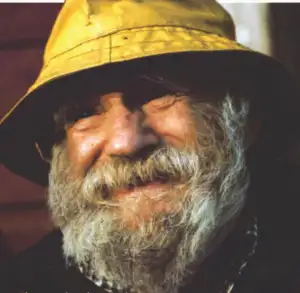
Are you nice? Most Canadians want to be and claim to be. However, before you answer, let’s clarify the meaning of “Nice”.
An adjective that is purposely vague, purposely non-committal, purposely avoids action word & is pretend politeness.
To me it is the ultimate Canadian word – like ‘sorry’. Yuk. I prefer being and DOING good – what about you? I will try to convince that our CDN society’s valuing ‘nice’ above good action is a part of the reason for our inability to get anything of substance done to improve our lives. Yes, we ‘try’, but usually what we hear is a constant barrage of ‘sorry’. Let’s go back to 1977 while I was a student at McGill. At that time I was inoculated against the disease of ‘niceness’ by a hilarious picture of drunk students in a ramshackle room drinking beer with arrows pointing everywhere saying ‘nice’. Clearly the sofa was not nice. Clearly the garbage on the floor was not nice. Cleary the unshaven face was not nice. That was, of course, the point. We say nice, but often either don’t mean it or actually mean the opposite. The modern version of this image is this famous meme about climate change from the New York Times. “This is fine” does not mean this is fine — not on social media. The three-word phrase now doubles as shorthand for when a situation becomes so terrible our brains refuse to grapple with its severity.



Here is what the creator of meme, K.C. Green, said about it when asked why it is so popular:
Why has it become so popular? Because it’s a feeling we all have, apparently. It’s a feeling we all get of, just like, “Things are burning down around me, but you got to have smile sometimes.” It’s a basic human [feeling] to avoid facing things that are just plain overwhelming. The real question is, of course: “Well, what are you going to do about it?” When you say fine [or nice] it infers that you are going to do nothing.
Here’s the problem with nice: usually being nice is more important than get things done. Why is that? Perhaps it is because doing good, which requires an action with some connection to the truth of the real world, means you have to be harsh, even a little cruel. It pulling out a splinter nice? No. Is it good? Yes. Is it cruel. Yes, if you think only of the moment the splinter is being pulled, but NO if you think of the motivation and result. Right now, in Canada, we have a lot of splinters to pull out. Is it going to hurt? Of course! Is that nice? NO! Is it good? YES! Here are some specific “splinters’ we need to pull out that are going to hurt:
Shut down the Tar Sands
Stop building single family homes in suburbia
Reduce immigration significantly so we can build enough affordable housing and have enough hospital beds and long term care beds available with reasonable emergency room wait times
Stop advertising of gambling, marijuana, alcohol as addictions kill
Actually, REALLY deal with homelessness, the opioid and mental health epidemics
Have clean drinking water on all reservations and deal with the mercury poisoning of Grassy Narrows
Building a strong naval and military presence among our Artctic islands so that we can protect our soverienty and make the northwest passage CDN waters
End our worship of GDP growth
Prevent the extinction of more species like the Woodland Caribou
You get the idea. Take the declining woodland caribou population as an example: how do we stop the freefall decline in population? First we must ask: why are woodland caribou declining? The population is declining as a result of these changes to predator-prey dynamics, scientific evidence indicates that habitat change resulting from the extraction of natural resources is the main factor leading to unsustainable predation rates on caribou, and the leading proximate cause of woodland caribou declines. So how do we stop this decline? Stop the extraction of natural resources [timber, mining] where they live! Is this going to be easy & “nice”? No. Does it go completely against our worship of GDP and the almighty $ ? Yes. Will it hurt is to change? Yes. Is this the right choice, the good choice? YES!
Of course, as a bunch of cynical old guys and gals we know that a new mining development, like the proposed Ring of Fire [the Feds have already said they will help pay for the infrastructure to develop this region] will always over ride our “heartfelt desire” to protect the woodland caribou. It’s as if our leaders are characters in a game. There is actually a game where a character is called “Affably Evil”. He is a villain who is polite, friendly and genuinely kind, even while plotting evil. To me that sounds like most of our leaders. But don’t blame them – you and I voted them into power! The ‘affable evil’ is us. In what way are we evil? We are purposely ignorant. Which brings me back to my dislike of ‘nice’. Here is a bit of the history of the word NICE that highlights the connection between ignorance and our current CDN “niceness’ which has stopped us from doing actions that are GOOD.
Nice had originally a negative meaning. It started coming to use with Latin nescius meaning ignorant. From there, it developed the meaning coy. This, in turn, gave rise to nice meaning perfectionism or being fastidious. This led to nice meaning “subtle and fine”. This final meaning was held correct and all the meanings started growing surrounding it. From 1300 to 1400s nice was all about being luxurious and well dressed. Then onwards it moved more toward the attitude of the people, and then nice meant refined society. In the 1800s, nice started meaning shy, reserved and delicate, thanks to Jane Austen’s use of the word to describe good things.
People wanted to appear less friendly, and the credit goes to the 50s notion of people not wanting to be a “nice guy” anymore. This was influenced by the song lyrics of that time. However, “Nice guys” are what the millennials call the “forever friend zoned” guys or the guys that aren’t actually that “nice”. Though it can also be used unironically to mean a person who’s actually really nice. The modern times have multiple meanings of nice. The most commonly used meanings are: pleasant, enjoyable, attractive, delightful, mild, well-intentioned, enough and virtuous. The lesser common meanings are: obscene, trivial, lacking vigor.
A final note. When we explored what to do to stop the decline in the woodland caribou population I stated that the GOOD actions needed are NOT easy or nice. I want to emphasize now the connection between EASY and NICE. Nice is easy. You look nice. I have nice hair. That is a nice apartment. Always, and I mean always, nice is the easy way out. Goodness [and truth] are never easy. They are HARD. Being good can be uncomfortable. Even deadly. Ask Socrates. Ask Jesus. Ask Ghandi. Ask Martin Luther King Jr., ask Ralph Edwards – a once famous CDN who lived on remote Lonesome Lake in BC from 1912 to his death in 1977 and who was responsible for saving the Trumpeter Swan from extinction. This is what he had to say about how real living is never easy/nice – but it is GOOD.
Something else had much to do with his conquest of life in a lonely wilderness. Ralph loved the challenge of whatever was difficult, and the greater the obstacle the more he marshaled all his forces to overcome it. From his early years as a youngster he had never sought the easy way out. Now he had chosen an objective and a place to live where every inch of progress must be fought for; where every task required his maximum effort; where his strength and ability were constantly on trial. He delighted in proving to himself that he could overcome the heaviest obstacle. He even welcomed the opposition of the elements and geography. On his rare winter mail trips he often tramped down Lonesome Lake’s 7 miles in the teeth of bitter gales or blizzards, ‘glorying in the combat, often unable to see across the lake at its narrowest point’. When at last he had surmounted the terrible trail, had trudged the remaining long miles across the Stillwater and on down to Atnarko’s huddled cabins, he arrived with a triumphant smile on his frost bitten face. Ralph believed that there is little that a human being can’t do if they do their homework and then apply themselves and stick to it. More people give up than fail.” The journalist then asks, “So, no one failed here?” He replied, “Oh, many times but we never gave up.”
What can you do? Be as true to yourself as Ralph Edwards was, only then can you do great things. Only say sorry if you really mean it. Don’t give up. Stop being nice and instead be and DO good.

Ralph Edwards
https://www.theverge.com/2016/5/5/11592622/this-is-fine-meme-comic
Crusoe of Lonesome Lake by Leland Stowe
Leave a Reply